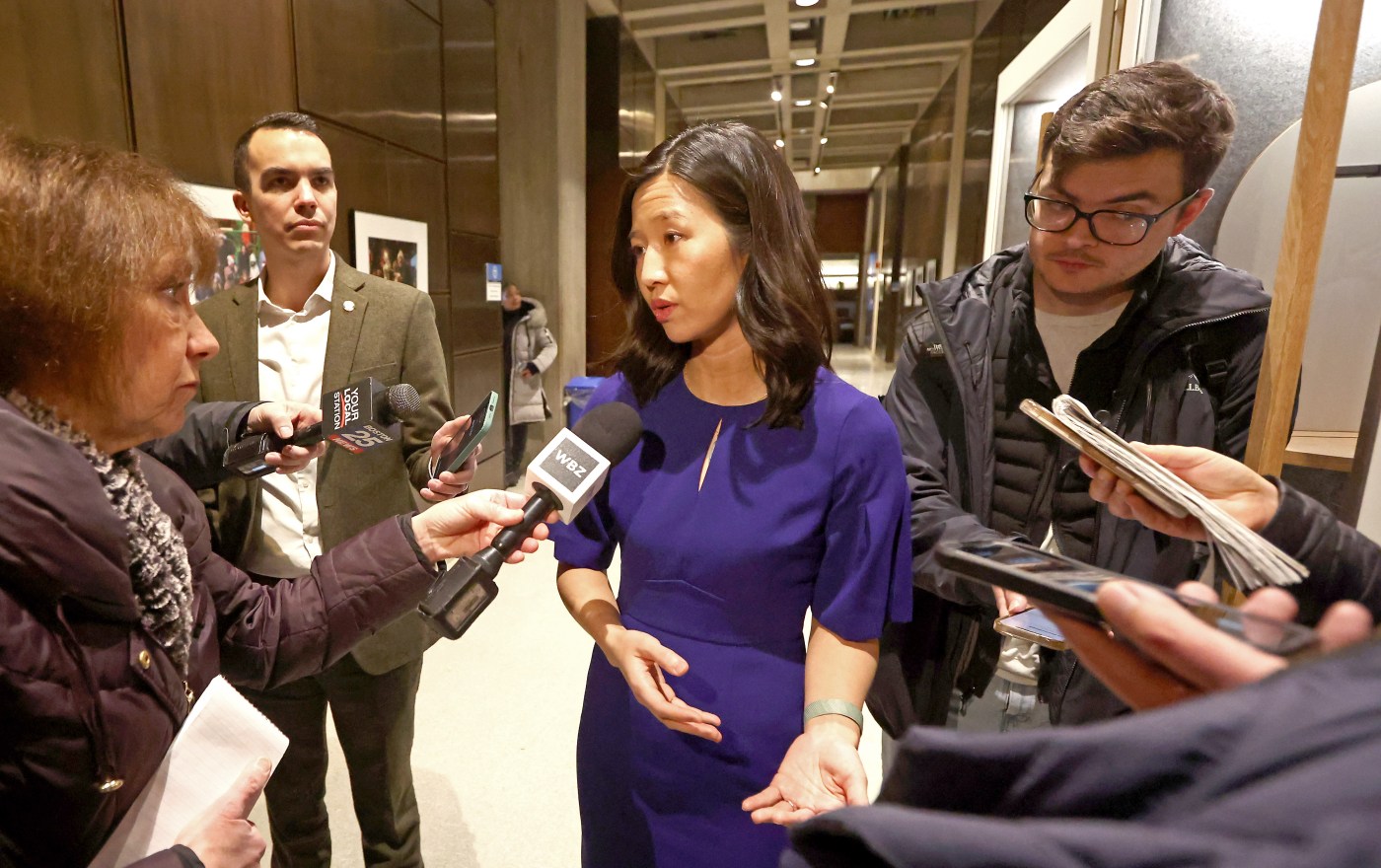
Boston Mayor Michelle Wu says community centers shouldn’t be used as migrant shelters
Boston Mayor Michelle Wu is standing firm in her stance that the state-run Melnea A. Cass Recreational Complex in Roxbury is not an appropriate site for a temporary overflow shelter for migrants and that other cities and towns in the state need to step up in the crisis.
“We should not be using community centers for migrant shelter,” Wu told reporters after an unrelated event at City Hall Thursday. “The surrounding community in Roxbury and the local leaders who are involved came to the table and acknowledged how big of a sacrifice this would be, one that no other community has been asked to shoulder at all across Massachusetts.”
“Because it would be temporary,” she continued, “and because it would address a pressing emergency that everybody felt compelled to do something about with babies, pregnant women and families sleeping on the ground at Logan Airport, this community stepped up and said ‘We will once again do what no one else is doing.’”
Wu’s comments are similar to the ones she provided late last month, on the day Gov. Maura Healey confirmed her administration would move forward with the plan to convert the Cass center into a temporary overflow shelter for migrants who had been spending nights at Logan Airport.
“For the first community where this is being proposed to be Roxbury, a community that over so many decades has faced disinvestment, redlining, disproportionate outcomes, it’s very painful and it’s painfully familiar,” Wu said during a WBUR Radio Boston program on Jan. 29. “It feels like a particular inflection point when we are now taking offline buildings that are beloved and well-used and dedicated to community programs because we now have such a crisis.”
The center, as of last week, was quickly reaching its 400-person capacity, Wu said. But a spokesperson from the state Executive Office of Housing and Livable Communities told the Herald Thursday that 100 individuals were being housed at the Cass.
Wu alluded to the neighborhood’s willingness to turn over the recreational center, operated by the state Department of Conservation and Recreation, to migrants stemming from Healey’s “firm commitment” that the shelter will close by May 31 and plan to make the facility “brand new.”
The mayor said the city expects the facility’s pool, showers and bathrooms will be renovated and staffing increased. Prior to the shelter, community groups had to scale back its programming and time slots due to staffing shortages, Wu said.
The cost and specific details of the upgrades remained under consideration when the migrant shelter opened. DCR did not immediately provide a response to a Herald inquiry Thursday.
“Many of the dollars being spent to make this possible to serve families, for food, for laundry, for security, for cleaning services, have all been connected to putting dollars back into this community,” Wu said.
Nine of the 10 programs displaced from the Cass have been relocated, with DCR working with the last program, Franklin Park Tennis, to find an alternative location.
The latest tally from the state showed 7,526 families living in emergency shelters as of Thursday, with nearly 700 on a waiting list.
Those numbers don’t including the number of migrants entering the state as single individuals. Massachusetts is only legally required to house homeless families due to its right-to-shelter law.
Wu highlighted how the city’s adult shelter system has become “increasingly strained.” Earlier this week, she confirmed a former Mass and Cass addiction outreach center on Atkinson Street as an overnight shelter for homeless people, including newly arrived migrants, who have been sleeping on the floor at the Southampton Street men’s shelter.
Wu said she and Healey “have very frequent conversations about the scale and scope of the crisis as well as the ways in which we are trying to work together to meet immediate needs but also think about the long term.”
“When you really focus on the fact that this is about housing and this is about space there are larger conversations that could better account for the fact that different communities might have more available space or might have more underutilized buildings and areas that could be used,” the mayor said.
A total of 94 cities and towns are providing emergency shelters, most of them being middle-income communities, with just nine communities having household incomes above $150,000, the Boston Globe reported last week.
A parish in Newton providing a safety-net shelter for up to 30 families since November had been kept out of the public purview because of threats of violence, but that changed this week, however, when officials addressed security at the site.
Meanwhile, the United Way, which has partnered with the state to identify shelter space for migrant families, is “evaluating” a church group’s proposal for such a use in a Fort Point office building in Boston’s bustling Seaport neighborhood.
“We are doing more than any other city by far,” Wu said Thursday. “That is always going to be Boston’s role, but it is not enough and we need every community to be a part of this conversation, and also we need the federal government to be realistic about how this is impacting communities on the ground.”


